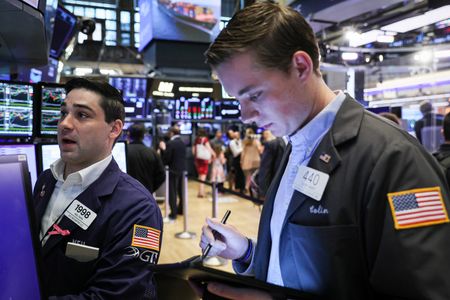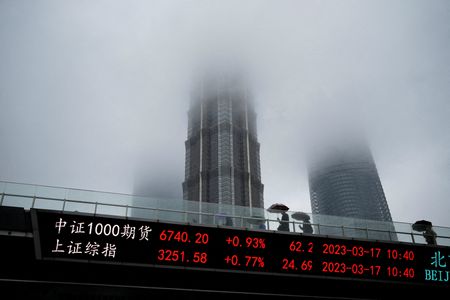By Chris Prentice and Marc Jones
NEW YORK/LONDON (Reuters) -Progress on U.S. debt ceiling talks bolstered global equities and sent gold prices to a two-month low on Thursday, as forecast-smashing revenue from chipmaker Nvidia fueled a rally in AI-related companies.
Treasury yields were up and the U.S. dollar climbed to its highest level since mid-March.
European markets fell under pressure from news that its biggest economy, Germany, had sagged into recession.
U.S. President Joe Biden and top congressional Republican Kevin McCarthy were edging close to an agreement on the U.S. debt ceiling, according to a person familiar with the talks. The two sides were just $70 billion apart on a deal, the source said.
The S&P 500 climbed 0.88% to end the session at 4,151.28 points and the Nasdaq surged 1.71% to 12,698.09 points, while the Dow Jones Industrial Average declined 0.11% to 32,764.65 points.
Shares of Nvidia surged over 24% after the firm reported forecast-smashing revenue, indicating Wall Street has yet to price in the game-changing potential of artificial intelligence.
The MSCI world equity index, which tracks shares in 49 nations, gained 0.18%.
The pan-European STOXX 600 index closed 0.3% lower, bringing its losses over three consecutive days to about 2.7%, knocked down by recent losses in luxury stocks and concerns over the talks to raise the U.S. debt ceiling and avert a default.
Updated German GDP figures showed the euro zone powerhouse slipped into recession in the first few months of the year despite an initial reading suggesting otherwise.
The data pressured the euro, which was down 0.2%.
Asia had been divided overnight with Japan plodding higher [.T] but Hong Kong tumbling almost 2% to its weakest level of the year amid renewed geopolitical concerns surrounding Hong Kong-listed Chinese tech giants such as Tencent, Alibaba, AIA and Meituan.
News of progress in the U.S. debt talks came as traders were wary of a possible default in early June.
A credit ratings downgrade could affect the pricing of trillions of dollars of Treasury debt securities. A warning about just such a move by Fitch on Wednesday was mirrored by smaller rival DBRS on Thursday.
On the interest rate front, minutes from the Federal Reserve’s latest meeting released on Wednesday showed that policymakers “generally agreed” that the need for further rate increases “had become less certain.”
Boston Fed President Susan Collins said on Thursday the time may be at hand for the U.S. central bank to push the pause button on its interest-rate-hiking campaign to assess the impact of past tightening.
“Most of the morning’s data supported more Fed tightening, so traders ignored Fed’s Collin’s comment that a rate pause would give us space to assess actions to date,” said Edward Moya, senior market analyst at OANDA.
The number of Americans filing new claims for unemployment benefits rose modestly last week, and the prior week’s data was revised sharply lower, the Labor Department said.
The dollar index, which tracks the greenback against a basket of currencies of other major trading partners, rose to 104.25.
Treasury yields surged on signs of persistent strength in the U.S. labor market, but gains on short-term bills were pared when top congressional Republican Kevin McCarthy said some progress had been made in talks to raise the debt ceiling. [US/]
Gold slid to its lowest level in two months on Thursday as optimism around the U.S. debt ceiling talks lowered safe-haven demand for bullion and robust economic data fueled bets of another rate hike by the Fed.
“It’s a one-two punch for gold. … If a deal is done over the weekend, then that will remove the biggest risk off the table,” Moya said.
Spot gold prices fell 0.87% to $1,939.97 an ounce, and gold futures settled down 1.1% at $1,943.70.
Oil prices dropped by $3 a barrel after Russian Deputy Prime Minister Alexander Novak played down the prospect of further OPEC+ production cuts at its meeting next week.
U.S. crude finished down 3.38% at $71.83 a barrel, and Brent crude futures settled down 2.7% at $76.25 a barrel.
(Additional reporting by Deep Vakil in Bengaluru and Ankur Banerjee in Singapore; Editing by Andrew Heavens, Kirsten Donovan, Nick Macfie, Leslie Adler and Sonali Paul)



